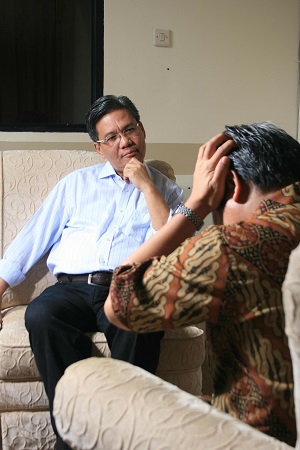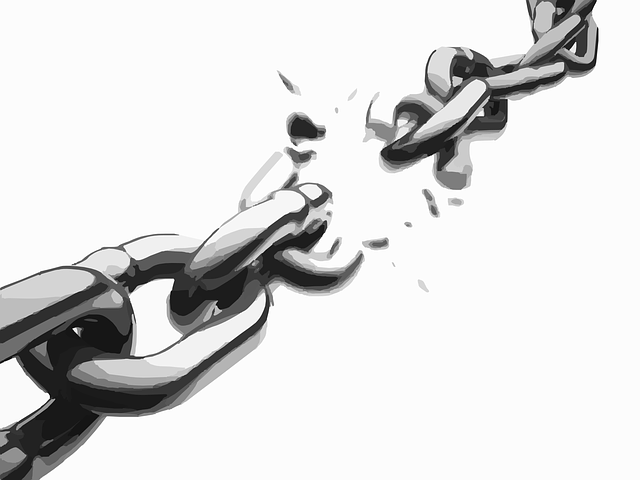Frontotemporal Dementia
FTD
Frontotemporal Dementia is a consequence of damage caused to the cells Frontal and the Temporal Lobes of the brain. Each lobe carries out operations specific to each area and the dementia depends on the nature of the damage to specific areas of the brain.
 Realisation and understanding of mental health problems
Realisation and understanding of mental health problemsDementia patients suffering from damage to the Frontal Lobe - which is behind your forehead - suffer changes to personality, emotions and behaviour as well as to their cognitive skills, such as reasoning, planning and decision-making.
The Temporal Lobes are on each side of the brain - directly behind the Frontal Lobes - and their main function in a healthy brain is in the understanding and use of language and knowledge and recognition of faces and objects.
As mentioned elsewhere, Alzheimer's Disease and Vascular Dementia tend to be most prevalent in older people. For those two dementias, Age is a significant factor; however, most people who suffer from Frontotemporal dementia can be much younger. About seventy percent of sufferers are between 45 and 65 years of age. This dementia is also referred to as a Young Onset Dementia - for obvious reasons.
Causes of FTD
One major consequence of frontotemporal dementia is that the frontal and temporal lobes shrink in volume, which obviously impact on the functioning of the brain.
There can be a build up of known toxic proteins in the lobes which will cause death of brain cells and impact on cognitive faculties as listed above. What causes the toxic protein build is not yet known. Tau, being one of these toxic proteins, is also a factor in the damage that causes Alzheimer's Disease.
Another cause of this type of dementia is a specific genetic disorder (mutation) that can run in families. This causes a sub-group of dementia known as Familial Frontotemporal Dementia. There is a fifty percent chance that the gene will be further transmitted. Young people in a family with a history of this particular dementia face a very difficult challenge whether to undertake genetic testing or not.
I will write more about the nature of genetic testing for dementia later and of the difficult decisions that will arise. It can be a deeply emotional dilemma for parents.
Types of Frontotemporal Dementia
- Behavioural Covariant Frontotemporal Dementia or bvFTD
- Semantic Dementia
- Progressive Non-Fluent Aphasia
- FTD associated with Motor Neurone Disease
- FTD associated with Corticobasal Degeneration
- FTD associated with Proressive Supranuclear Palsy
The first three of these types of FTD above remain unique in their early stages and a dementia patient can have his or her dementia diagnosed as one of them. In the later stages of dementia the symptoms will have more in common with late stage dementia.
(Also, a patient can suffer one of the first three with one of the latter three conditions overlapping and bringing greater complexity to the dementia. More on this on another page).
Behavioural Covariant FTD (BvFTD)
This is a diagnosis that refers to behavioural changes caused by damage to the cells of the frontal lobe of the brain. It is social behaviour and personality that is most changed and it is manifested, for example, by a loss of inhibition uncharacteristic of the person in behaviour, a lack of sympathy or empathy for others. A cruelty to comments and views and a generalised apathy. More on these symptoms later.
- Ritualised behaviour
- Obsessive Compulsive Disorder (OCD)
- Generalised apathy
- Unawareness that their behaviour and personality has changed.
Semantic Dementia
This is caused by damage to the cells of the temporal lobe that function to understand language, recognise and name objects and people. When we are in normal brain health but stressed we can present with some of these symptoms: losing the meaning of words, cannot find the right word. As I write above, the early signs can be very subtle and misattributed.
Association of Frontotemporal Degeneration CLICK HERE
Alcohol Related Brain Damage CLICK HERE
Progressive Non-fluent Aphasia
As in all dementias they are complicated by where in the brain the cell damage occurs.The frontal and temporal lobes deal with language and speech.
Aphasia, simply put, means loss of language and the ability to articulate coherently. There is a loss of the ability to understand the complexity of conversations and a loss of fluency in speech.
Frontotemporal Dementia (FTD) Diagnosis
As in many types of dementia the changes in the early stages can be very subtle and can often be misdiagnosed Atypical Alzheimer's Disease or misattributed to medical, environmental or psychological disorders.
Dementia diagnosis can be difficult because this is a dementia that affects younger people. Incidentally, there is no gender difference in the statistics of sufferers of Frontotemporal Dementia. Men and Women suffer equally.
The early stages can be difficult to diagnose; however, as the damage to the specific areas of the brain increases in severity the symptomology of these types of dementias frontotemporal share more and more commonality. The significant differences in the early stages of the illness become less. The symptoms of Late stage dementia are common to all.
There is currently no cure for frontotemporal dementia, although, thankfully there are medicines that can ameliorate the symptoms as they develop and dependency grows from autonomy to complete dependency.
As with Alzheimer's Disease and Vascular Dementia, the symptoms of frontotemporal dementia worsen over time. Some dementia patients suffer symptoms similar to Parkinson's Disease and experience difficulty with the most basic of functions, such eating, swallowing, walking and talking.
In the rarer dementia Creutzfeldt Jacob Disease patients can die within six months of contracting the disease. However, people suffering from frontotemporal dementia can live as long as fifteen years. Many of those years in complete dependence.
Younger people who are diagnosed with FTD face very severe consequences. They may have young children, be the main breadwinner and with mortgage payments to service.
Dementia Caregiver
In the Late Stage Dementia the severity of the disease can bring very serious challenges to family, friends and professional caregivers. That this dementia FTD occurs in relatively young people because of the major changes in behaviour. Referring back to Behavioural Covariant FTD above, the disinhibition in the early stages and a tendency to excess can create havoc in families.
Frontotemporal Dementia causes devastating effects on the sufferer. In all dementia types the impact on family, friends and dedicated caregivers can be traumatic. Caregivers must take definite steps to ensure their own wellbeing otherwise they will not be able to continue to support and care for loved one.
This latter point refers to my area of expertise as the long term carer for Mam. I got much it wrong with regard to my own health and wellbeing.
This website is called Dementia Devotion because it requires devotion to care for a dementia patient. But if you disregard your own health then you will not be able to fulfill your role. You will eventually find plenty of advice on this website. The dementia patient is on an inevitable journey and while the carer must ensure the dignity of the patient, he or she must survive to live their own life afterwards.
Do you have anything you wish to share?
Please feel free to write to me
Go to Dementia Devotion DEMENTIA TYPES Page
Go to Dementia Devotion HOME Page
This website was built with SBI Video Tour

Recent Articles
-
Dementia Diary. We Must Break Her. It's my name she calls constantly
Dementia Diary. We’ve Got To Break Her.We had all agreed that we had to accept and commit ourselves to the hope that the dementia carers would become her family -
Dementia Diary Page 3. Love, Trauma and Laughter all within minutes
A Dementia Diary. The days that passed were full of Love, Laughter, Kindness and Exquisite Pain. Be ready to weep, laugh and, as usual, hate bastard rabbits. -
Dementia Devotion - Beautiful Karen Carpenter just ran out of time
Dementia Devotion - I keep thinking about beautiful Karen Carpenter who was so caught up in other people's demands that she ran out of time to save herself. -
Betty suffered dementia the last few years and was a very nice lady
Dementia Diary Day 31 Red Squirrels, Rabbits (again) & Suicide Salad - The first news I heard this evening from the Head Nurse, was that Betty had just died -
dementia diary day 30. Has The Mafia Assassin Revealed Her Identity?
Has The Dementia Care Home Assassin Revealed Her Identity? Her right eye was swollen, almost closed and the bruising ran from darkest blue, purple to black -
Dementia Diary Day 20 - Purpose, Futility & Bastard Rabbits!
Dementia Diary Day 20 - Purpose, Futility & the Bastard Rabbits! Eating My Garden







